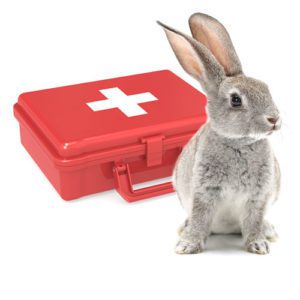Do you have a first aid kit at home for your pet? If not, how prepared are you and your pet for an emergency? While we always recommend contacting your veterinarian if you think your pet is having an emergency, it’s important to know what steps you can take right away to keep your pet stable while you determine if they need of medical attention. Make sure you have a first aid kit that all family members are familiar with.


What should you keep in your pet first aid kit?
- Vet wrap – Veterinary wrap is a colorful, clingy bandage material used by veterinarians to cover wounds and bandage injuries in pets. It is sold in drug stores as a beige, over-the-counter bandage for people. Pick some up at your local pharmacy or from your vet to keep on hand to keep wounds clean, control bleeding, and prevent your birds from picking at open wounds.
- Styptic powder, flour, or corn starch – all helpful when trying to clot blood from a broken blood feather or broken nail. These clotting aids should not be applied to open skin wounds, and pets that are bleeding profusely should be examined by a veterinarian as soon as possible.
- Oral dosing syringe – if your pet is sick and needs to be syringe fed or given oral medication, it is important to keep a variety of different sized oral syringes on hand. Consult your veterinarian on the appropriate size for your pet.
- Glue removal – In the event that your pet gets stuck to something with a glue base, such as a glue trap, we recommend having a glue remover handy. A commonly used, safe brand we use at the Veterinary Center is Eaze Off by Millpledge. When using this product, be sure to spray it lightly over the glue and not near the bird’s face or eyes.
- Sterile gloves – if your pet has an open wound, have sterile gloves on hand so you can handle your pet without introducing bacteria or other germs from your hands into the wound.
- Gauze – To stop bleeding from a wound or keep a cut clean, you should have sterile gauze on hand.
- Hydrogen peroxide – if you need to clean the wound, use a little hydrogen peroxide. Never use isopropyl alcohol, as it is highly irritating and can cause significant discomfort for your pet.
- Q-tips – Q-tips can be helpful when trying to clean a concentrated area on your pet.
Conclusion
At the Veterinary Center for Birds and Exotics, we ALWAYS recommend that you contact us if you think your pet is having an emergency. By being available 24/7/365 for phone consultations, our staff can help you decide if your pet needs to be examined by a doctor right away or if it’s okay for you to make a scheduled appointment. Do not try to self-treat your pet at home or “Google” treatment. Doing so may cause more harm than good for your pet. If you think your bird is having an emergency, keep them in a warm, quiet environment to avoid any further stress, and call us right away.


